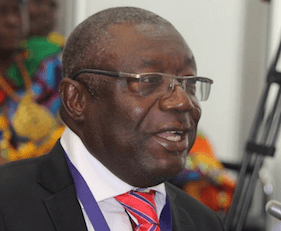
The Governor of the Bank of Ghana, Dr Johnson Asiama, at a recent press briefing in Accra, said Ghana was “on the right track to macroeconomic stability” and urged continued vigilance to consolidate the gains made over the past few months.
According to him, the local currency, The Cedi, has rebounded strongly against the major trading currencies. “In the year to May 21, 2025 the cedi had appreciated by 24.1 percent against the US dollar, 16.2 percent against the British pound and 14.1 percent against the euro,” he said.
He attributed this remarkable recovery to a tight monetary policy stance, record accumulation of reserves, disciplined fiscal consolidation, strict enforcement of foreign exchange market rules and improved investor sentiment. The central bank’s foreign reserves climbed to US$10.7 billion in April, equivalent to 4.7 months of import cover – one of the highest levels in years.
Another major development shared by the Governor was the sustained decline in inflation. “Headline inflation has dropped consecutively in the first four months of the year, reaching 21.2 percent in April 2025—a fall of 2.6 percentage points since January,” he reported.
According to Dr Asiama, the easing inflation was supported by multiple factors, including tight monetary policy, reduced ex-pump petroleum prices, stability in the exchange rate and stepped-up liquidity sterilisation efforts.
“The Bank’s core inflation measure, which excludes energy and utility prices, along with inflation expectations from businesses and households also point to continued disinflation,” he noted. The Governor expressed confidence that the country’s inflation could reach its medium-term target by the first quarter of 2026.
It is undisputable fact that since February, this year, the Cedi has been appreciating against the major world currencies – Dollar, Pound Sterling and Euro. The government, businessmen and Ghanaians as a whole are all happy with the development. Prices of Petroleum products have tumbled severally within the past two months and corresponding reduction in lorry fares by 15%.
This means that the appreciation of the cedi is being felt by every Ghanaian and we commend President Mahama, his Finance Minister Dr Cassiel Ato Forson, the Bank of Ghana and all those who helped to achieve the current feat. But much as we are all happy with the continued appreciation the local currency, the government should note that it is the same way Ghanaians would protest if, God perish our thought, the Cedi starts depreciating again.
This is the reason why the government should stop celebrating the record achievement and rather start planning on how to sustain the gains made so far. Governor Asiamah, in touting the achievement of the government attributed the strong showing of the cedi to record accumulation of reserves, disciplined fiscal consolidation, strict enforcement of foreign exchange market rules and improved investor sentiment.
He also referenced the central bank’s foreign reserves that climbed to US$10.7 billion in April, equivalent to 4.7 months of import cover – one of the highest levels in years. No doubt these are all measures that have contributed the appreciation of cedi against the dollar and others.
But these factors notwithstanding, should the government take off her foot off the accelerator pedal and allow imports to always exceed exports, as experienced in the past, the factors named by Dr Asiamah cannot, and we repeat, cannot help the cedi to gain strength.
The Chronicle is, therefore, advising the Mahama government to start implementing import substitution measures, especially in the agricultural sector, to help sustain the current stability the economy is enjoying.
In 2024 alone, Ghana reportedly imported food items worth GHC38.95 billion or $3,530,857,618.50 per the current exchange rate.
Meanwhile, this country of ours has rich lands that can easily produce most of the food items we are wasting the dollar to import. Akomadan in the Ashanti region and Demah in the Ahafo region, for instance, can produce tomatoes to feed the whole nation, yet we spend hard currency like the dollar to import the same produce from Burkina Faso.
Again, in Keta areas in the Volta region and major parts of the northern region, the country has the capacity to produce onions, but again we waste dollars that would have propelled this country into higher heights to import the same produce from Niger. In the case of rice, we, as usual, have arable lands that can be used to produce it, but because of lack of policy direction, we keep on importing these grains.
These are all factors that would contribute to the free fall of the cedi in future and The Chronicle advises the government to start thinking fast before she is caught off guard. With the implementation of the free Senior High School programme, can’t we encourage people to invest in rice production to feed students, who are in their thousands? Clearly, somebody must start thinking outside the box before the gold we are selling to rake in more dollars becomes a useless venture, because the gains would have been eroded by excessive imports.
The post Editorial: Import Substitution Is The Long Term Answer To Cedi Stability appeared first on The Ghanaian Chronicle.
Read Full Story















Facebook
Twitter
Pinterest
Instagram
Google+
YouTube
LinkedIn
RSS